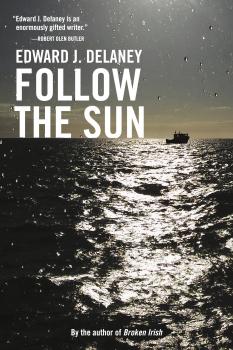ТОП просматриваемых книг сайта:
Edward J. Delaney
Список книг автора Edward J. DelaneyАннотация
" Follow the Sun is just plain fantastic. Edward J. Delaney has orchestrated a tight, tense page-turner and a harrowing, deeply imagined literary portrait of an entire family. . . . What a knockout read." — Paul Harding "In this pungent, gritty novel, hardscrabble lives are rendered with utter realism, terrific dialogue, and a slow-burning tenderness for all concerned. Delaney's knowledge of this milieu is never in doubt, and his control of the material is masterful." — Phillip Lopate Quinn Boyle is a lobsterman afloat in a shambled vessel, haunted by his battles with lobsters and with heroin, and ever behind on his child support. Since Quinn lost a man off his boat and served time for possession, only naïve beginners will work with him. On his final lobster run, Quinn's down to his last options. He hires on an old nemesis, Freddy Santoro, who's facing prison time of his own. Three days later, they're both gone, lost without a trace. Robbie Boyle, a small-time local sportswriter, looked after his younger brother as best he could. Now that Quinn has disappeared, Robbie reaches out to Quinn's estranged daughter, Christine, and assumes the fatherly role his brother never shouldered. A year later, as they admit they might be better off without Quinn's complicated presence in their lives, Robbie gets a strange tip: Santoro is apparently living in the Pacific Northwest. Telling no one and risking everything, Robbie sets out to find Santoro and determine what happened to Quinn. What he discovers will remap the course of their lives. Edward J. Delaney is an award-winning journalist, filmmaker, and author of three previous works of fiction. He has received the PEN/New England Award, the O. Henry Prize, and a National Endowment for the Arts Fellowship. His short fiction has appeared in the Atlantic and Best American Short Stories , in anthologies, and on PRI's Selected Shorts program. Born and raised in Massachusetts, Delaney lives and teaches in Rhode Island.
Аннотация
In prairie towns and backwaters, and in the big cities, people search for themselves and their lost way. Is the American dream still possible in this big, harsh land? The short fiction in The Big Impossible explores guilt and redemption, aspiration and failure, and the stubbornness of modest hopes. The usual mileposts are fading, and choice is in the context of institutions and assumptions that are no longer holding steady. In “Clean,” a man waits for inevitable justice to come, as much as it will play against him. In “House of Sully,” a working-class family navigates the tumultuous year that 1968 was, as new perceptions shake long-held and dependable, if sometimes misguided, beliefs. Other stories examine the inner life of a school shooter, the comical posturing of writers at a literary party, a British veteran of The Great War living at a Florida retirement home but haunted by his losses, and a man’s bittersweet visits to past lives via Google Street View. In the sequence set in the West, an itinerant worker moves across the Great Plains, navigating stark landscapes, trying for foothold. The Atlantic ’s C. Michael Curtis praised Ted Delaney’s debut collection for its “moral intensity . . . in the tradition of writers as varied as Ethan Canin and William Trevor.” Two decades later Delaney returns to the short fiction form with utter mastery.


